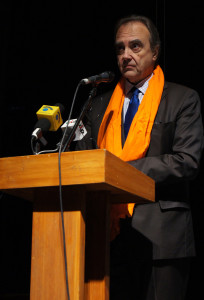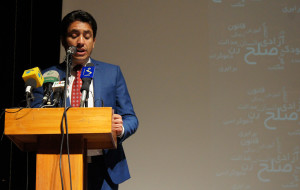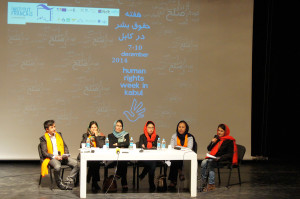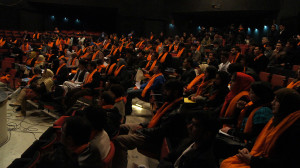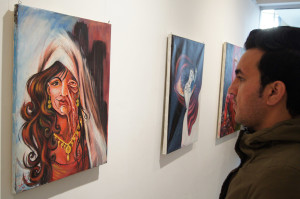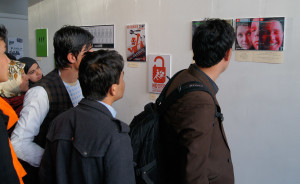7 December 2014
Venue: French Institute of Afghanistan
Speakers: Member of Parliament Ms Shinkai Karokhail; Ms Monira Yousefzada, Civil Society Activist and participant of London Conference; Ms Nafisa Azeemi, Head of the Parliamentary Committee on Women’s Affairs, Civil Society and Human Rights; Dr Alema, political and international relations adviser to the Ministry of Women’s Affairs; and Mr Akram Zaki, in charge of Policy and Advocacy at Oxfam Afghanistan
Moderator: Ms Anahita Boboeva
On Sunday 7 December 2014, the first day of Human Rights Week 2014 began under the title of “Women’s political participation and safeguarding achievements”, in which a number of intellectuals, civil rights activists, representatives of various embassies including the first secretary of the French Embassy in Afghanistan, university professors, students and citizens of Kabul took part.
Mr Jean-Yves Roux, the first secretary of the French Embassy in Afghanistan, welcomed the guests and the audience and said: The Human Rights Week, the principal executor of which is Armanshahr Foundation has the support of several national and international institutions. The French Embassy is also one of its supporters. All humans are equal. This is one of the most important principles of the Universal Declaration of Human Rights. In 1948, the United Nations recognised this Declaration, which has been accepted by both France and Afghanistan and stands at the top of all human rights and values. France has endeavoured to consolidate the human rights foundations in Afghanistan. We have used all the methods and means at our disposal to prepare the suitable political, legal, social and cultural grounds to promote the internationally accepted human rights notions and values. This program today is one of those means. We defend any dialogue that will bring humans closer to each other and promotes the culture of exchange of ideas.
We have witnessed many improvements in the field of human rights in this country in the past few years. The existence of the Afghanistan Independent Human Rights Commission is a great achievement. There has been progress in regards to women. One of them is the Ministry of Women’s Affairs after the departure of the Taleban. I do not mean to ignore the problems and obstacles. I believe we do not have any other choice but to be optimistic and to join each other to resolve the problems and overcome the obstacles. The task that Armanshahr Foundation has set for itself can be a starting point. Undoubtedly, nobody can advance the process of consolidation and institutionalisation of democracy alone. Armanshahr Foundation has made great endeavours towards this goal and has taken confident and strong steps towards it. It is time for all of us to step on that path together.
You will be more acquainted with human rights notions and foundations in these four days and I hope that the programmes will be fruitful and beneficial to you. The morning workshops are educational ones, but the afternoon discussions are designed on the eve of the World Human Rights Day to concentrate on implementation and practicability of human rights notions and protecting human rights defenders. In conclusion, I hope that you will make the most of the programmes of the Human Rights Week, as an initiative of Armanshahr Foundation.
Mr Rooholamin Amini, deputy director of Armanshahr Foundation, made the opening speech of the Human Rights Week. He said:you are guests of Armanshahr Foundation, which has valued humans and fought for freedom in Afghanistan in the past eight years and in the region throughout the past 18 years. This is the 138th Goftegu – dialogue – public debate of Armanshahr. We have addressed a large number of people for many years, more than 20,000 people have addressed us and we have published more than 150,000 copies of books in the service of collective wisdom. We are still living the excitement of the 2nd International Women’s Film Festival – Herat, which we organised in collaboration with the Roya Film House a while ago.We take as good omen the coinciding of the beginning of the 18th year of Armanshahr Foundation with the Human Rights Week and we are pleased to host all our dear guests during this happy week.
Moderator of the programme, MsAnahita Boboeva, pointed out: The Human Rights Week comprises different programs that takeplace in the French Institute of Afghanistan in Kabul from 7-10 December. The human rights educational workshops are for students and civil rights activists. Debates and dialogues between the people, the elite and the officials as well as the cultural events are other programmes. Our public debate today is concerned with “Women’s political participation and safeguarding achievements”.
We cannot forget that women’s achievements are not limited to those under the new system, but they have been gained in the past 100 years. Women of Afghanistan have been fighting for their rights for a century. Unfortunately, however, they are still in a fragile and vulnerable situation. We believe that the new government of Afghanistan should, from the first days of its work, engage in comprehensive and effective consultations with all the people, women’s rights activists, human rights defenders and progressives in order to eliminate all forms of violence against women. It should ensure that women are represented at all governmental levels and important political decisions. We know that this is not a simple task in Afghanistan and shall take a long time to be realised. It is clear that the conditions of women in every society are the barometer of democracy, freedom and progress. Half the population cannot be deprived from presence at important centres of decision-making. We believe that the solidarity of all strata of the society is essential to achieve improvements in women’s conditions.
Ms Shinkai Karokhail was the first speaker to address the meeting, who said: Women must enjoy all the same rights that men have. Throughout history, women have either not been taken seriously or have been suppressed. We proposed three important bills of law to the previous government on women’s issues. Unfortunately, the government created many hurdles. Finally, we managed to persuade the government to sign one of our bills, i.e. the Law for the Prohibition of Violence against Women. However, the Parliament did not approve the law and deprived the women from achieving their objective. Nevertheless, the law is in force at present. The Shi’ite Personal Status Law has also changed a lot. We made great efforts to change it and amended many of its articles. I know that this law is still extremely undemocratic and unfair. However, it is fortunate that it is no longer as cruel as before.
The second speaker, Ms Monira Yousefzada pointed to the title of the meeting and said: we have to specify what an achievement is. How do we define an achievement? In my opinion, the work of the Ministry of Women’s Affairs in the past 13 years does not represent an achievement. On the other hand, when we refer to women’s political participation, we have to find out the factors that prevent it. In my opinion, we can find the strongest preventive factors within women themselves. If we were to conduct a study on women right now, it would become clear that the majority of women do not believe in themselves. Our traditional society is another factor. Tradition has driven many men to describe women’s participation as some kind of violation of the norms. It is crystal clear that women shall not have the opportunity to display their political features under such circumstances. Women are used as instruments in political affairs at present. Active women do not play a role in decision-making and have merely a symbolic role. I also wish to inform you that most foreign backers of Afghanistan promised us during the London Conference that they would concentrate on processes and long-term plans and would not support short-term projects anymore.
Speaking about the conditions of women, Ms Nafisa Azeemi said: Women do have the same capacity as men. Unfortunately, however, men do not allow women to occupy high positions. Therefore, we asked the new government of Afghanistan to comply with its obligations. Thirty-eight per cent of women voted in the elections. We have a right to take 38% of the government posts and positions. Women must play an important role in establishing security. Women must achieve unity to exert pressure on the government to specify women’s share in different areas, in particular in the political domain.
Dr Alema disagreed with a part of Ms Yousefzada’s remarks: Women’s struggle did not begin 13 years ago but under King Amanullah. There were four women in the Parliament in the Democracy Era. It is true that we have gained equality under the law, but we have never enjoyed equal opportunities. One of our achievements is that there are executive bodies to implement the Law for the Prohibition of Violence against Women in 12 provinces. You know very well that the 25% quota of women was reduced to 20% in the provincial councils and totally abolished in the district councils in the past few years. However, I still do not believe that the women’s movement is on the retreat or in crisis. In my opinion, everything is changing and the changes are in favour of the women’s movement.
Mr Zaki was the last speaker, who said: Oxfam recently published a report on peace talks and women’s presence in the society and in politics. One of the findings of the report was that women had not been present in 23 peace negotiations between the government and the opposition. The report indicated the degree of the impact of women’s presence in or absence from peace talks. Even though the international community has consistently spoken of women’s presence and participation and has even made it a condition for financial assistance to Afghanistan, women are systematically and invisibly driven out from many areas and lose their share. The government must move from claims to action and seriously recognise women’s status and identity.
Question and answer session:
Mr Abdulmojib, a second-year student of the School of Law and Political Science asked Dr Alema: What do you think of women who are begging in the streets or have been living in safe homes for many years without any clear future in sight?
Dr Alema replied: The Ministry of Women’s Affairs has an extensive plan to round up the beggar women from the streets of Kabul or other big cities and is planning to lead them to normal life through different ways. However, many women living in safe homes are not facing any problems anymore, but they do not have anybody or anywhere to go back to. That is why they are still living in these homes. Some of them are still facing problems.
Mr Khoshnam, a civil society activist said: My question is directed at all honourable speakers. What plans or policies have you been pursuing to bring women out of politicisation, political deals and traps?
Ms Shinkai Karokhail replied: I do not think it would be possible to distinguish women’s issues from political issues and I do not believe it would be a correct thing to do. Women are seeking to find that their proper and reasonable status in politics and play their role in big decisions. However, if you are referring to the politicisation of the process to achieve women’s rights, it is very difficult to depoliticise this process. The civil society, the international community and the government all say they support women’s rights. However, none of these have prevented deals between the government and the Taleban in peace talks behind the curtains.
Ms Anahita Boboeva asked Members of Parliament: What specific proposals do you have for the new government to improve the conditions of women and to defend their rights?
Ms Nafisa Azeemi replied: As a member of the Women’s Committee of the Parliament, we have presented our proposals to the national unity government of the president and the chief executive of the government. If women constituted 38% of the voters in the elections, they must receive the same share in the Cabinet, the Supreme Council of the Supreme Court, the various departments, as governors, police chiefs and other governmental positions. We believe that the national unity government has the will to improve the conditions of women and we hope to achieve our demands with the support of the civil society.
Ms Shinkai Karokhail also offered her reply: Our first demand from the government is that it should make a political commitment to empower the women of Afghanistan. Furthermore, the budget must be balanced on basis of gender, because financial resources play a key role in changing women’s conditions. Allocation of financial resources will lead to education and health of women and help them economically to stand on their feet. It is after that that they can come forward as active citizens and decision-makers. There is also the issue of women’s participation in key positions and decision-making bodies. We have asked the international community to make the government of Afghanistan accountable for its obligations. They should offer conditional assistance and not support any project or process where women are not present, including the peace process. On the other hand, the international community has not allocated big funds to women and improvement of their conditions in previous years. It has always provided small funds to keep them busy.
Mr Hekmatullah Hekmati, a final-year student of Kabul University, asked: Ms Yousefzada, how can you talk about justice and at the same time be pleased with having a 25% quota in the provincial councils?
Ms Yousefzada replied: Fair competition in the elections shall take shape when men and women enjoy all the rights and powers to take part in those competitions. You know very well that women have been deprived of those rights and benefits either tangibly or intangibly. What do you suggest under the circumstances? We do not have a choice but to bring some fairness to the unequal competition. The 25% quota for women is one of the approaches to do this. If you have any other solutions, please share it with us.
Art Exhibition:
Upon the culmination of the meeting on Day One, Ms Laurence Levasseur, director of the French Institute, opened the Arts Exhibition, which consists of three sections.
- Winners of Political Posters Competition, where the exhibited works mostly were concerned with human rights related themes.
- Film box screened the works of an Afghan woman painter.
- Exhibition of the works produced in the educational workshop of the French artist and instructor Margalit Berriet, where works of the students of the Fine Arts School of Kabul University are on display.

